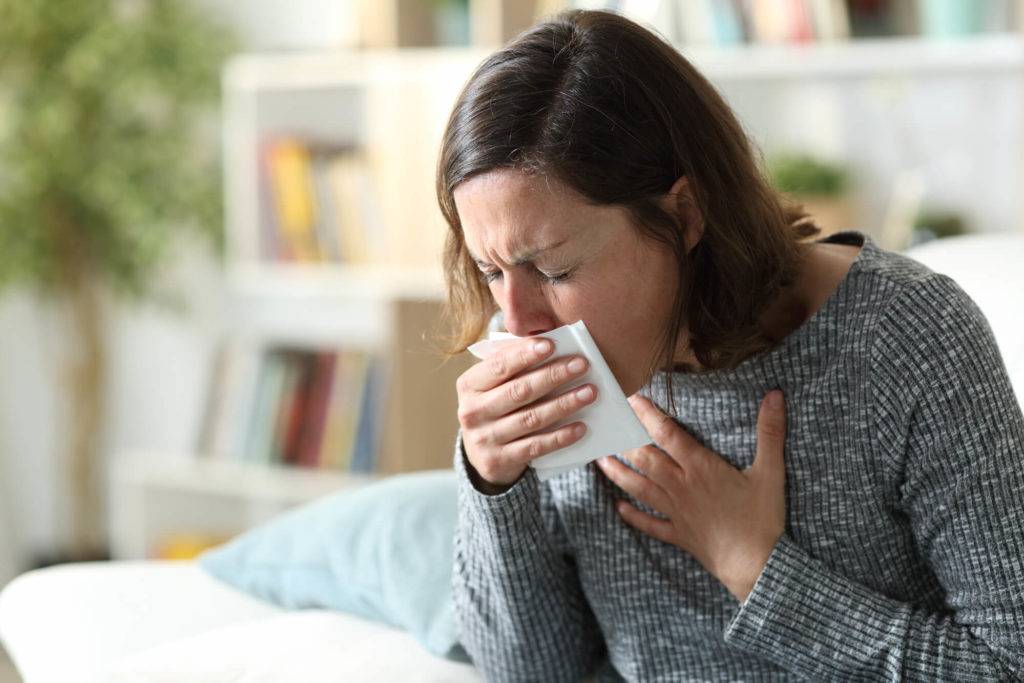When is a Cough Serious?

We all cough. Of course, three years of pandemic living has made coughing in public a slight social faux pas. COVID has made people more aware of how, where, and when to cough.
But why do we cough, and when is it severe enough to warrant medical attention?
Why We Cough
A cough is a spontaneous reflex, and you cough when stuff like mucus, germs, or dust irritates your throat and airways. Coughing is a reflex just like blinking or breathing that protects your body from foreign objects.
Your throat and airways have multiple nerves that sense irritants and send signals to get rid of them very effectively. In fact, coughing propels air and particles out of your lungs and throat at nearly 50 miles per hour!
Most of us occasionally cough just to clear our throats and airways of dust and germs. Coughing moves the mucus produced by our bodies to protect and moisten our airways against these particles.
Infrequent coughing helps mobilize the mucus without damaging our bodies while getting rid of unwelcome particles.
Classifying Coughs
As you probably already know, there are different types of coughs. You can have an acute or chronic cough (a cough that lasts more than eight weeks). Smokers typically have a distinctive chronic cough.
An acute cough lasts about three weeks or less and likely clears itself without medical attention. However, you should see your doctor if you have symptoms that accompany a cough, like fever, a headache, drowsiness, shortness of breath, or other problematic symptoms.
Acute coughing is caused by:
- Upper respiratory infections in your nose and throat
- Hay fever, aka allergic rhinitis
- Inhalation of irritants like fumes and vapors
- Lower respiratory tract infections in your airways and lungs
- Pulmonary embolism
- Collapsed lung (pneumothorax)
- Heart failure
- Post-nasal drip
- Gastro-esophageal reflux (GERD)
- Damaged vocal cords
- Some medications such as Vasotec, Zestril, or other ACE inhibitors for high blood pressure
Acute coughing is a typical symptom of COVID-19 infection and long COVID (long-haul COVID-19).
Upper respiratory infections caused by viruses are typically accompanied by fever, sore throat, and a runny nose. The common cold, viral laryngitis, and influenza cause upper respiratory tract infections.
Lower respiratory tract infections are serious. They are caused by bacteria and viruses that reside deep in your airways, causing bronchitis and pneumonia. They include a deep, lingering cough and fever.
A subacute cough lasts between three and eight weeks, improving by the end of the period.
A chronic cough lasts longer than eight weeks and persists long-term; it could mean you have a more severe or chronic lung disease. People with asthma often have a chronic cough accompanied by wheezing.
Left untreated, a cough can result in dizziness, headaches, tiredness, fractured ribs, or worsening conditions.
Taking Care of Your Cough
There are some simple ways to take care of your cough and soothe your throat, including:
- Sucking on cough drops or hard candy (for people six years or older)
- Drinking honey or ginger in hot tea
- Using a cool mist humidifier
- Taking a steamy shower
- Gargling with warm salty water
- Avoiding tobacco smoke or other fumes and vapors
- Elevating your head with extra pillows to sleep
You can also use OTC medication to reduce fever and relieve pain if necessary. Always follow the dosing instructions on the package or bottle, especially when giving medicine to children.
When to Seek Medical Treatment
Go to the doctor if the cough doesn’t resolve within a few weeks or if you’re coughing up yellowish-green mucus. If you experience wheezing, fever, shortness of breath, fainting, ankle swelling, or weight loss, visit your doctor.
At the doctor, you may or may not receive medication. Antibiotics don’t work for viral illnesses, which are often the cause of acute coughing and upper respiratory infection. Anti-viral medications are effective only when taken within two days of symptom onset.
Many OTC medications are as effective as codeine cough syrup and are less likely to cause other side effects.
Coughing becomes an emergency when the person is choking or vomiting, has difficulty breathing or swallowing, coughs up blood mucus, or experiences chest pain. Some conditions involving cough that are medical emergencies include:
- Pulmonary embolism – This serious is condition caused by a blood clot traveling from the legs to the lungs. It causes sudden shortness of breath and, sometimes, a dry cough.
- Collapsed lung – When a lung suddenly deflates spontaneously or due to chest trauma, the person often has sudden chest pain, a dry cough, and shortness of breath.
- Heart failure – Due to a build-up of fluid in the lung from a weak or diseased heart, the patient may experience a cough and worsening shortness of breath.
If you or a loved one experience concerning symptoms along with a cough, it’s always better to be safe than sorry. Visit your doctor or the nearest emergency room if you are experiencing a medical emergency.
Can You Prevent Coughs?
You can prevent or reduce coughing in some cases.
Quitting smoking will improve cough. The coughing may not stop entirely, but it should lessen over time.
Avoid people with contagious illnesses like colds and bronchitis. Remember, those germy particles are moving at 50 miles per hour. Frequent hand-washing helps prevent the spread of germs.
A high-fiber diet rich in fruit may help reduce a chronic cough with mucus, and if you have GERD, avoid eating three hours before bedtime.
Seek Assistance from Family First ER
Call 911 if you have severe breathing difficulties or chest pain.
If you or a loved one has a severe cough, rest assured that Family First ER is prepared to help. We have experienced physicians, nurses, respiratory therapists, and other staff who are available 24/7 to provide the care you need for your severe cough.

